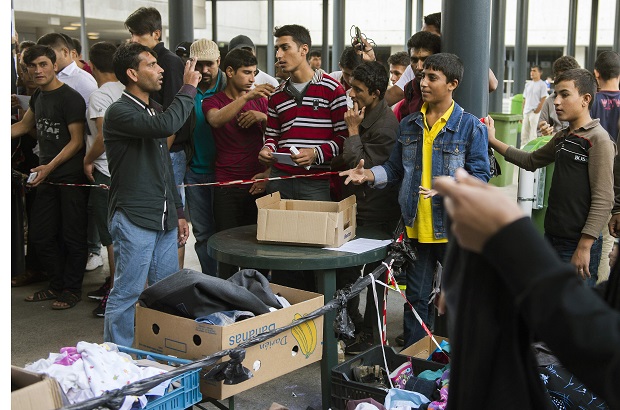Tensions flare at Hungary station as migrant numbers swell

Migrants line up for the distribution of clothes at Keleti railway station in Budapest, Hungary, Friday, Aug. 21, 2015. AP
BUDAPEST, Hungary—Scuffles broke out between migrants and police in Hungary on Wednesday as thousands were left stranded at Budapest’s main international train station, while the government called for clarification on Germany’s asylum regime.
As the number of migrants prevented from boarding trains to Austria and Germany swelled to over 2,000 at the Keleti station, according to an estimate from an AFP photographer, crowds chanted “No police! No police!” and “Germany! Germany!”
READ: Budapest train stations morph into makeshift refugee camps
On Wednesday afternoon, the protesters, angry at reports of police removing migrants from the station to unspecified locations, ran up to a police line and began shouting and throwing plastic bottles. Traffic was blocked for around 15 minutes.
The officers were quickly reinforced by riot police, who donned helmets and after a tense standoff pushed the protesters back to stop them blocking the road. No one appeared to have been hurt, and calm gradually returned by nightfall.
Article continues after this advertisementREAD: Europe in new migrant standoff as figures show scale of crisis
Article continues after this advertisementThe standoff was the latest and largest of several tense encounters between the crowds and police following Hungary’s decision to prevent migrants traveling west on Tuesday, after several thousand boarded trains bound for Austria and Germany the previous day.
Hungary’s government explained the U-turn by saying it was applying EU law after confusion caused by an easing of Germany’s asylum regulations and called on Berlin’s embassy to clarify the rules.
Sporadic fighting broke out between migrants on Wednesday, while taunts from a small group of far-right skinheads sparked some scuffles.
Earlier, tempers rose when the police suddenly moved in to clear a pathway in the “transit zone,” a makeshift underground refugee camp where thousands have been sheltering on blankets in cramped conditions, looked after only by Hungarian volunteers.
“My friends got on a train on Monday! Why the hell don’t they let me go too, all of us?” 41-year-old Syrian protestor Ohlit told AFP in front of the station, furiously brandishing his ticket to Munich that he purchased Monday.
‘Freedom!’
The EU’s so-called “Dublin” rules oblige refugees to claim asylum in the first EU country they reach, but news that Germany had waived those rules for Syrians last week has sparked a surge in migrants trying to reach Europe’s largest economy.
The German embassy told AFP that “Dublin” rules still apply, adding that “it would be very helpful if the (Hungarian) authorities communicated directly what the situation is to the people at Keleti, who might think they are able to go.”
But Hungary’s Prime Minister Viktor Orban’s chief of staff, Janos Lazar, said it was up to the embassy to “unambiguously clarify” Germany’s position on asylum-seeking.
“What type of legal procedures should illegal migrants count on if they want to reach Germany? And what can they expect after,” he said in a statement.
As well as the crowds at Keleti, several hundred migrants have been camping out at nearby John Paul II square, as well as another train station Nyugati (western) across the city.
Early Wednesday, police closed down part of a suburban train station in Budapest, and surrounded 100 migrants traveling from the southern border who refused to board a connecting train to a refugee camp in Debrecen.
Chanting, “Germany! Germany!” and “Freedom!” the group held a sitdown protest still ongoing by late evening.
Later, around 4,000 people took part in a migrant solidarity march from Nyugati station to parliament organized by the volunteers providing aid at the train stations.
“The Hungarian government does nothing to welcome those people,” one protestor told AFP.
‘We’re staying here’
Hungary has in recent months joined Italy and Greece as a “frontline” state in Europe’s migrant crisis, with 50,000 people trekking up the western Balkans and entering the country in August alone.
The right-wing government headed by Orban—who was due for talks in Brussels on Thursday—has responded by erecting a controversial razor-wire barrier along its 175-kilometer (110-mile) border with Serbia.
In addition it is building a four-meter high fence, and on Thursday parliament was due to begin debating a series of new laws to deal with the influx, including greater police powers and using the army at the border.
However, Hungary’s razor-wire barrier is proving ineffective in keeping out the tens of thousands of people trekking up from Greece through the western Balkans, with Hungarian authorities saying that 2,284 crossed on Tuesday, including 353 children.
“Normal people, abnormal people, educated, uneducated, doctors, engineers, any people, we’re staying here. Until we go by train to Germany,” said Mohammad, a Syrian protesting at the station earlier Wednesday.
Bilal, a fellow Syrian from the divided city of Aleppo, that there is an urgency to get into Europe.
“We fear that one day everything will change, that even Germany will close the border when it has had enough. So we must make our journey extremely fast,” he told AFP on Tuesday near Serbia’s border with Hungary.